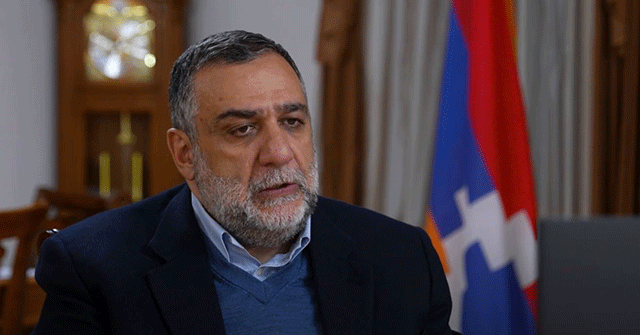New York, NY – Artsakh State Minister Ruben Vardanyan highlighted Azerbaijan’s pursuit of ethnic cleansing, while Senator Chris Van Hollen (D-MD) stated that the United States must hold Azerbaijan accountable for its human rights violations during the panel discussion on “Preventing a Second Armenian Genocide: Azerbaijan Closes the Lachin Corridor and Makes Artsakh Unlivable in a Bid to Depopulate the Territory.”
The virtual event, attended by 600 guests, was hosted by Columbia University’s Program on Peacebuilding and Human Rights on Wednesday, February 1, 2023, featuring co-panelist Van Z. Krikorian, Co-Chair of the Armenian Assembly of America, and moderator David L. Phillips, Director of the Program on Peacebuilding and Human Rights at Columbia University, who leads Columbia’s Artsakh Atrocities Project.
Senator Van Hollen bluntly stated that Azerbaijan has embarked on the “latest chapter” in its “campaign of aggression against Nagorno-Karabakh.”
“For over 50 days, Azerbaijan has imposed a blockade on the region, cutting people off from deliveries of food, medicine, and other daily necessities,” he said, noting that among those stranded are 30,000 Armenian children, 20,000 Armenian elderly, and 9,000 Armenians with disabilities.
Read also
“We’re witnessing a rising humanitarian crisis and we can’t remain silent in the face of these malign transgressions,” continued Senator Van Hollen, who has joined his Senate colleagues to urge Secretary of State Antony Blinken to stop U.S. assistance to Azerbaijan and continues to “call upon the Biden Administration to promote peace.”
“The U.S. must be prepared to take action to hold Azerbaijan accountable,” Senator Van Hollen stated, while committing to work with his colleagues to “end the blockade and ensure to do everything we can to promote the basic principles of justice, peace, and human rights.”
Providing further context to Azerbaijan’s blockade of the Lachin Corridor, Philips noted that closing the road that connects Artsakh to Armenia is a “flagrant violation of ceasefire terms and a violation of international humanitarian law.”
Azerbaijan’s disruption of access to essential goods and services, including food, fuel, and medication for 120,000 Armenians in Artsakh, “affects the most vulnerable populations, including the young and the aged,” he added.
“This campaign is part of a systematic effort to make Artsakh unlivable and drive Armenians from their historic lands,” warned Phillips. “These actions constitute a second Armenian Genocide.”
Artsakh State Minister Vardanyan shared on-the-ground insights from the last 52 days of the blockade, where the only access Artsakh Armenians have to essential goods is through the assistance of the Red Cross and Russian peacekeepers, bringing in limited quantities of food and medication.
He described the human toll that the blockade has already taken on Armenian families in Artsakh, and made special mention of children who have been separated from their families, as well as the psychological price they are paying by being deprived of education as their schools are shut down on account of electricity shortages.
He cited the importance of support from the U.S., France, and the Diaspora in order to bring a resolution to the blockade and highlight the human rights violations by Azerbaijan.
Despite the challenges, Vardanyan emphasized the “bravery” of the Artsakh Armenians, who continue to stay “very strong” and have a “will of resistance to live on their own homeland and keep their own traditions alive.”
“For the past 30 years, a transparent democratic system has been developed in Artsakh” that has resulted in a “civilized society,” according to Vardanyan, who noted that an air corridor is needed to transport supplies to Artsakh without being dependent on the road.
“It’s been a privilege to live in Artsakh, which is a unique and special place,” said Vardanyan, whose grandmother was a native of Artsakh. “Living here with them has given me a lot of energy for myself and my nation” to preserve the small, democratic republic and its traditions of self-government.
Addressing the central concern over the genocidal threat posed by the closing of the Lachin Corridor, Krikorian pointed out that, contrary to other genocidal situations, there is a “clear record going back many years that the intent of Azerbaijan is to solve the ‘Nagorno-Karabakh problem’ by eliminating the Armenians.”
Krikorian corroborated his statement with several quotes from Azerbaijan’s government officials, resulting in “piles and piles of evidence on genocidal intent, which is usually one of the hardest things to prove in these situations,” he said.
“This is not just a blockade of the 5 km-wide Lachin Corridor, this is cutting off of gas supplies, cutting off electricity, cutting off internet,” said Krikorian, who highlighted a larger plan by the Aliyev regime, that has been in power for decades and generations. “When we look at situations that call for meaningful peace agreements, we have to look at whether the leaders are preparing for peace or more war. It’s clear the President of Azerbaijan, and his partner [Turkey’s President] Erdogan, are preparing the people of Azerbaijan for more war, through their racist policies and education they’ve given their children.”
The question and answer session touched upon the psychological impact of the blockade on the local population, shortages of electricity and fuel, efforts to clear cluster mines from the 2020 war and prior, and Azerbaijan’s motives to depopulate Artsakh of its Armenian population.
“Aliyev said it clearly that [he sees] Artsakh without Armenians,” said Vardanyan. “Ethnic cleansing is a goal that the regime declared and it’s not a secret.”
In the face of these seemingly tremendous challenges, Vardanyan conveyed the hopes sustained by the Artsakh Armenians as he travels around the territory and talks to families in different villages, who reiterate their strength and ability to continue to live in difficult conditions.
Vardanyan concluded, “Artsakh Armenians share the values and importance of the past, but are ready to fight for their future.”























































